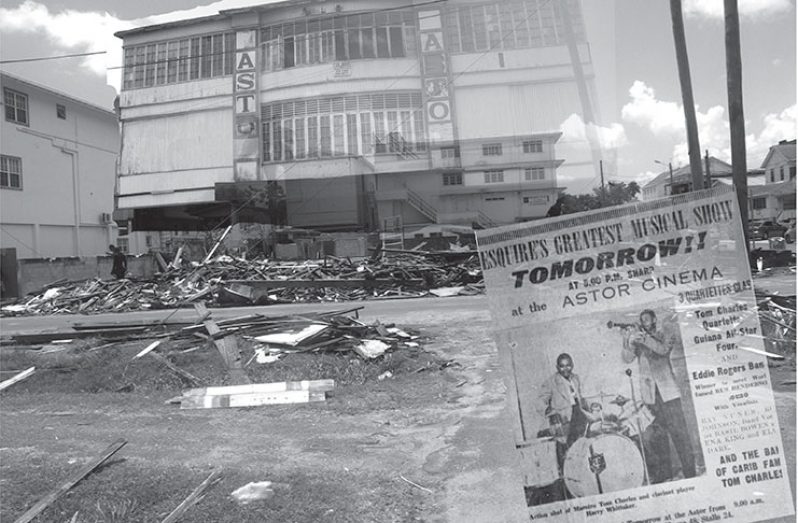THE fall of the cinemas in Guyana as Freddie Kissoon recently outlined is symbolic of the end of an era. But it reaches further than that; it embodies a reality that was captured by a female colleague recently, that “we are not a people too concerned by our history, or loss of it.”
The decline of the cinemas did not just happen; it happened because our politics is saturated by simple people that follow a narrow political template and are insensitive, impatient and lack the ability to empathise with anything contrary to concerns outside of their constituency and private agendas.
Though the TV stations are presumed to be the nemesis of the cinemas, they emerged in the mid-to-late-80s under President Desmond Hoyte. Yet, the demise of the cinemas, our traditional places of commercial entertainment and much more, occurred under the authority of subsequent PPP administrations.
What has to be extracted from this article is the evidence of an absence of a functional team for prioritising diverse pockets of economic activities and ensuring protective measures to reasonably sustain the wage- earning ability.
Cinemas exist everywhere worldwide alongside the TV station. All that is required of the government is the determination to establish the parameters of existence and quietly encourage and enable enforcement for functioning survival.
Both administrative governments failed in this aspect. I hold the Hoyte administration more responsible, because they represented a more urban and sophisticated group. The PPP presented itself as rural, provincial and communists who think that copyright is bourgeoisie.
As a matter of fact, any rights or issue at all that differ from direct constituency bounce- back party political benefits will escape their majority interests. The confusion with the PPP government and text-book piracy was an embarrassing case study and indictment against the progressive understanding of that authority.
With a minimum of regulations, the cinema industry in this country could have been saved, had a cultural, economic and social value been placed on that niche industry. Before the National Cultural Centre came into existence, foreign artistes decked the cinema stages to all-out ticket sellouts: Sam Cooke, Mahalia Jackson, Billy Erskine, Mighty Sparrow among other international performers.
According to my mother, before she had any of her children, she sang when Johnny Mathis performed at the City Hall. When my buddy, Andy Anderson was employed there, he tried to find any memorabilia of that performance. To our disappointment, no physical memory seemed to exist.
As a young man at the end of my school years, I can remember the incident when the American singer, King Floyd kissed a girl in a green dress on the Globe stage.
499
LOCAL VAUDEVILLE
The cinemas were not only venues for foreign artistes; local vaudeville was also performed there, with the Sam Chase-Jack Mello group doing skits and satire on local issues with poster narrations like:
“Calling All Politicians & Aspiring Politicians. All Election Candidates, Soap Box Orators. All Party Supporters & Traitors. All Revolutionaries and Counter Revolutionaries.
“See The Controversial Election Show Vote For Sam, The People’s Man, From Paccoo Dam.”
The cinemas were somewhere for dates; a break of sorts from the ordinary, and a location for profound experiences.
I followed ‘Smiley’; bought a ‘kickers’ at Bettencourt’s; dressed and went to the Metropole that Sunday afternoon with my date; nearly broke my ankle; spent that night with a toothbrush cleaning this piece of equipment, and by the following weekend had it resold. And today I watch young women in those ‘high-heel’ shoes with a sense of awe, pity and admiration. That was a profound cinema experience.
The cinemas were also missed by the newspapers; they occupied sometimes more than a page in the papers of what was showing at cinemas throughout Guyana, with write-ups and promos, collecting cinema booklets with set scenes etc.
This was cool stuff. The cinemas also enveloped a host of vendors, ticket hustlers, street-food restaurants, and after-show taxis among other after-show activities. It was part of the social network that needed improvement, but it employed people.
How could political people with the mandate to act turn a blind eye to all this and allow it to be lost to the fledgling TV industry of 85% piracy?
Today we have a Ministry of Business. This is an important entity, since we will no longer, as a country, be allowed to exist in isolation. Also, that private initiative and activity is where the job market will rest now and in the future.
The wider potential of taken-for-granted commercial entities cannot be recognised in retrospect; this, of course, requires engagement to cultivate the necessary percentage of shared vision.
I am not sure that the MoB can produce a catalogue of small and niche businesses across Guyana, not only for taxation purposes, but for development and linkages to what they are competing against, even in CARICOM.
The percentage of home businesses in America, last time I checked, was 43%. The cinemas are a tragic but good case study, for the shaping of a functional survival innovative perspective of the future.




.png)









